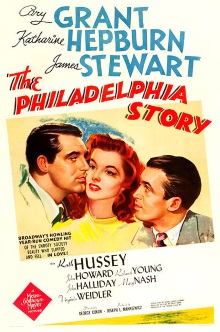
The filmography for the Marriage and the Movies course that we took earlier this year included a couple of movies by George Cukor and I remember Jeanine Basinger remarking that she would have chosen more movies by this director if she could. So it’s a pity that this one wasn’t even mentioned and I had to learn on Wikipedia that this is considered a prime example of the “remarriage” sub-genre of marriage movies: in which the couple divorces, flirts with other people and then possibly get back together again. Apparently this trick was contrived to avoid tripping the Hays Code which disapproved of extramarital affairs being depicted on film.
As such, Katharine Hepburn stars here opposite not one but three men, two of whom are A-list male stars. She’s Tracy Lord, a wealthy socialite who divorces a member of her own social circle C.K. Dexter played by Cary Grant at the beginning of the film. Some years later she is set to marry George Kittredge, a working class man who has become rich through hard work. The publisher of a gossip magazine wants to get the inside scoop on the marriage ceremony and manages to insert reporter Mike Connor (played by James Stewart) and photographer Elizabeth Imbrie into the household through Dexter’s influence. Tracy is dismissive of them at first but then discovers that despite needing to earn a living doing an unsavory job, he has hidden depths as a writer.
The jokes and one-liners fly fast in this comedy though the funniest character in here for me was Tracy’s young sister who likes Dexter and wants to get them back together. I love James Stewart as usual, especially as he gets to play an extremely drunk character for a rather long stretch of the film while interacting with a very amused Cary Grant. Unfortunately while it’s clear that the writers tried for some soaring lines, they feel weighty and awkward in execution. I’m guessing that this is probably because this was originally a play and lines that work well on the stage often feel unnatural in a movie.
Story-wise, I couldn’t make head or tails of Tracy’s character arc. I get that she’s supposed to have learned something significant out of her conversations with Mike and her own father but I don’t really understand what it is. Also, I realize that this was very much a personal vehicle for Hepburn as she also performed in the stage version and viewed it as a comeback vehicle after a string of commercial failures. But despite her seeming to be okay with it, it’s hard to shake the misogynist overtones of the plot: essentially the story is about a woman who discovers that she was a bitch and all of the men around her teach her how not to be one. Irritatingly, part of the lesson involved being cool about her own father’s philandering.
There’s no denying that it offers plenty of entertainment and some excellent performance by some of the most famous actors from the classic era of Hollywood. Still, it’s one of those films that are good to watch but not great enough to be required watching.